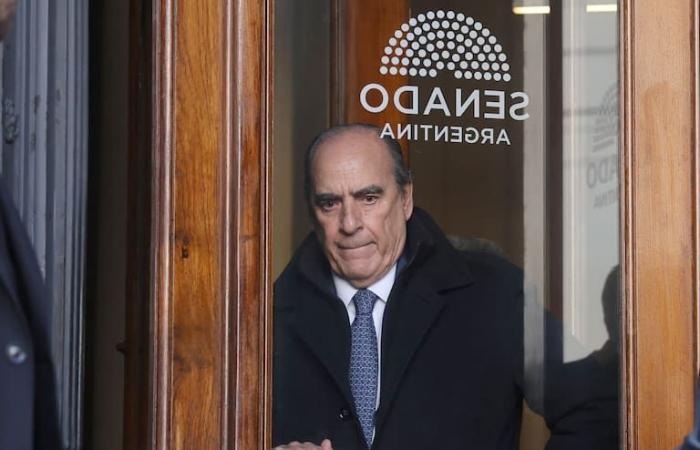Hear
A radical shift in the ruling party’s strategy was the key to the approval of the Base Law and the fiscal package in the Senate. With the arrival of the coordinating minister, Guillermo Francosthe Government sat down to negotiate with the opposition and, after multiple concessions, managed to unblock the agreements to move forward with the definitive sanction of the founding projects of Javier Milei. This process left winners and losers who will seek to seal or reverse their fate in Deputies, whose definition will culminate a long parliamentary process.
Conditioned by the need to exhibit governability, the Casa Rosada celebrated the endorsement of the Upper House despite having lost nodal points of the initiatives: the reimposition of the fourth category of the Income tax, the reconfiguration of Personal Assets and the possibility of sell to private companies Aerolíneas Argentinas, Radio y Televisión Argentina and Correo Argentino.
Meanwhile, he was able to save the delegation of powers to the Executive Branch in economic, financial, administrative and energy matters; as well as the rest of the privatization package. He also managed to avoid a setback in the money laundering – which was approved unanimously – and in the Incentive Regime for Large Investments (RIGI), which obtained 38 votes among radicals, macristas, libertarians and even Kirchneristas. To do this, the Government had to give in to specific requests from senators from the north, south and center of the country.
In it RIGI A crucial modification was introduced. This scheme can no longer be applied to “any sector that meets the prerequisites”, but rather It was limited to the following: forestry industry, infrastructure, mining, energy, technology, tourism, steel, oil and gas. This restriction was in the first Base Law that the Government sent – which Deputies changed –, although that text contained a sector that has now been excluded: the agroindustrial.
As far as he could know THE NATION, It was the senators of Santa Fe, Córdoba and Buenos Aires who asked to remove from this new wording the possibility that companies linked to agriculture could enter the RIGI. They sought to prevent foreign capital, through the generous benefits of the regime, from taking over one of the most productive sectors in the country, with local players already well established in the national and international market.
It was a concession that the libertarian administration admitted to avoid a surprise at a fundamental point for the economic project. In fact, sources close to the President told this medium that It will be Milei himself who “will be directly in charge of the implementation of the RIGI.” “He considers it so key that he is going to intervene directly in the regulations,” they detailed. In that sense, they alluded to the president’s experience in the private sector: “he worked on the subject for 25 years and knows how important it is to attract investments.”
Among other things, the regulatory decree must specify who will be the regime enforcement authority, responsible for approving or rejecting membership applications as well as supervision. The transfer of the investment promotion agency – which depended on the Foreign Ministry – to the General Secretariat of the Presidency, in charge of Karina Milei, increased suspicions that it may be under its orbit. Although official sources did not rule out this possibility, they indicated that it could also depend on the Minister of Economy, Luis Caputo. In any case, he will be a person of extreme trust of the President.
Among the supports that the RIGI garnered on the premises were three senators from Union for the Homeland (UP): Guillermo Andrada (Catamarca), Carolina Moisés (Jujuy) and Sandra Mendoza (Tucumán), seduced by the benefits for the mining sectorwith great potential in its provinces. They voted against the grain of their party and they showed the tensions within the bloc, where governors who are in good harmony with the Casa Rosada coexist.
In the sectors allied to the Government there were also fissures. Although the Pro bloc in the Senate voted in favor, the deputy Luciano Laspina He vented his anger on his I can’t think of anything more arbitrary, directing and discriminatory. “An enormous damage to the spirit of a general investment protection law for all those who want to invest in the country.” He technology sectorincluded as a possible beneficiary in the latest modification of the Base Law, is also a recipient of the Fuegian promotion regime that the Government shows no signs of wanting to dismantle in its spending adjustment plandespite the questions of a portion of the opposition.
Technology entrepreneurs also breathed a sigh of relief after the elimination of article 111 of the package of fiscal measures, which instructed the Executive Branch to increase 2% of the Gross Domestic Product (GDP) by eliminating tax exemptions or tax benefits. This clause, which was included under pressure from the Civic Coalition deputy, Juan Manuel Lopezfundamentally aimed to dismantle the benefits regime for industrialists of Land of Fire.
The rejection of this section brought together a diverse group of senators. The Fuegian radical, Pablo Blancowho changed his vote and prevented the Government from losing the delegation of powers, He was one of his main detractors. His blockmates supported him in his crusade to reverse the article, even though the members of the Deputies had provided the number to include it. Kirchnerism also agreed to eliminate it at the request of the governor of Tierra del Fuego, Gustavo Melella. All libertarians joined this challenge, which achieved 65 votes.
Only six legislators voted for it to be sustained: Lucila Crexell (Neuquén-Neuquén Community), Andrea Cristina (Cambio Federal-Chubut), Alejandra Vigo (Federal Unit-Córdoba), Carlos Espínola (Federal Unit-Corrientes), Edgardo Kueider (Federal Unit-Entre Ríos ) and Guadalupe Tagliaferri (Pro-Ciudad). It will be difficult to reverse this decision in the lower house, where to insist on its inclusion the deputies will have to gather a qualified majority. In his X account, López denounced a “corporate Senate.”
Another point that the Senate shielded from Deputies was that concerning tobacco. Thanks to the abstentions of twenty legislators from Union for the Homelandthe chapter seeking raise the internal tax rate on tobacco from 70 to 73% and eliminate the minimum tax that applies today. This article was contemplated in the original initiative that the Government had presented last December, but strikingly it was eliminated amid reports of crossed lobbies between the two main tobacco companies: Sarandí, which operates in the province of Buenos Aires and imports the input from Brazil; and Massalin Particulares, with terminals in the tobacco provinces of the north of the country.
For years, Tabacalera Sarandí, owned by the businessman Pablo Otero, benefited from a series of precautionary measures against the minimum internal tax that allowed him to market his company’s brands at lower prices than those of the competition. Days ago, the Supreme Court annulled these precautionary measures. With this new clause in the Bases Law, which puts an end to the current minimum tax, Otero must comply with his tax obligations and will be on equal terms with the other players in the market.
The governor of Salta, Gustavo Saenz, was one of the leaders who raised the profile the most with this struggle. In a meeting with local businessmen, he celebrated the ratification of this point by the Senate: “I began fighting alone, with a Tobacco Lord who, although I did not know him, did know that he was harming thousands of agricultural producers in our beloved Salta. and from different provinces.”






